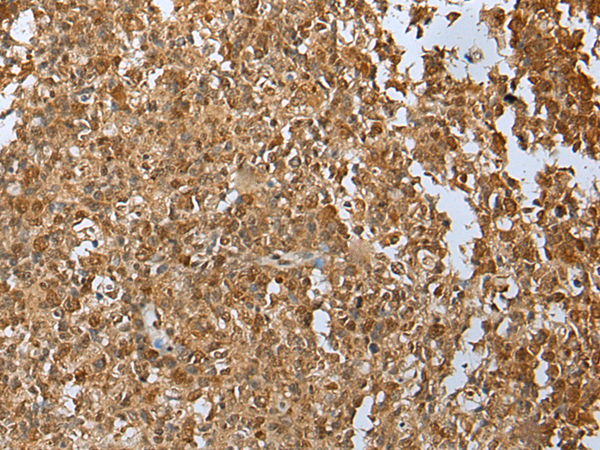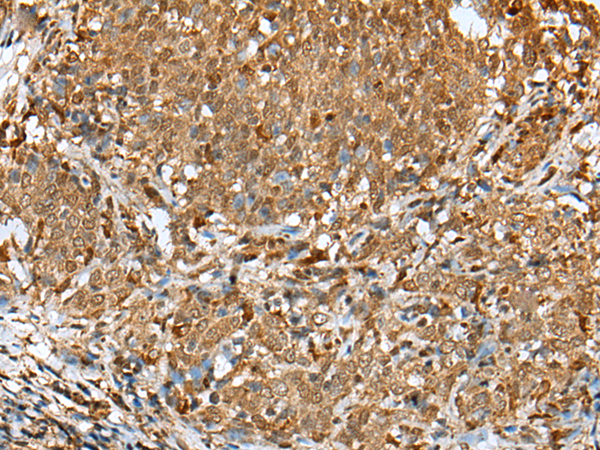

| WB | 咨询技术 | Human,Mouse,Rat |
| IF | 咨询技术 | Human,Mouse,Rat |
| IHC | 1/25-1/100 | Human,Mouse,Rat |
| ICC | 技术咨询 | Human,Mouse,Rat |
| FCM | 咨询技术 | Human,Mouse,Rat |
| Elisa | 1/5000-1/10000 | Human,Mouse,Rat |
| Aliases | D6S231E |
| Host/Isotype | Rabbit IgG |
| Antibody Type | Primary antibody |
| Storage | Store at 4°C short term. Aliquot and store at -20°C long term. Avoid freeze/thaw cycles. |
| Species Reactivity | Human, Rat |
| Immunogen | Synthetic peptide of human DEK |
| Formulation | Purified antibody in PBS with 0.05% sodium azide and 50% glycerol. |
+ +
以下是3-4条关于DEK抗体的代表性文献概览:
---
1. **文献名称**:*Autoantibodies to DEK oncoprotein in human sera*
**作者**:Sierakowska et al.
**摘要**:该研究首次报道DEK蛋白作为系统性红斑狼疮(SLE)患者血清中的自身抗原,发现部分SLE患者体内存在抗DEK抗体,提示其在自身免疫疾病中的潜在诊断价值。
2. **文献名称**:*The DEK gene is part of a translocation-derived fusion oncogene in acute myeloid leukemia*
**作者**:von Lindern et al.
**摘要**:研究揭示了DEK基因在急性髓系白血病(AML)中因染色体易位形成DEK-CAN融合蛋白的机制,并利用DEK抗体证实其在白血病细胞中的异常表达及致癌作用。
3. **文献名称**:*Autoantibodies to DEK in juvenile idiopathic arthritis*
**作者**:Waldron et al.
**摘要**:发现幼年特发性关节炎(JIA)患者血清中存在抗DEK抗体,提示DEK可能参与关节炎症的病理过程,或可作为疾病活动性的生物标志物。
4. **文献名称**:*DEK regulates chromatin remodeling and DNA damage response*
**作者**:Koleva et al.
**摘要**:通过DEK抗体介导的功能研究,发现DEK蛋白参与染色质结构调控和DNA损伤修复,其缺失会导致基因组不稳定性,可能与癌症和自身免疫疾病相关。
---
**注**:以上为根据领域研究的典型方向概括的文献示例,具体内容需以实际发表的论文为准。如需全文,建议通过PubMed或学术数据库检索标题或作者名获取。
The DEK protein, encoded by the *DEK* gene, is a chromatin-associated protein involved in DNA replication, RNA splicing, and epigenetic regulation. It plays roles in maintaining genomic stability and modulating transcriptional activity. DEK antibodies, primarily detected in autoimmune diseases, are most notably associated with systemic lupus erythematosus (SLE). These autoantibodies target the DEK protein, leading to its recognition in serum through assays like ELISA or immunoblotting.
First identified in the 1990s, DEK antibodies are present in approximately 10-20% of SLE patients, often correlating with specific clinical features such as photosensitivity, arthritis, or renal involvement. Their presence is also reported in other conditions, including juvenile idiopathic arthritis, rheumatoid arthritis, and certain cancers, though their pathogenic role remains unclear. In SLE, DEK antibodies may contribute to disease mechanisms by forming immune complexes or interfering with DEK's normal functions, such as DNA repair.
Research suggests DEK itself can be secreted by activated immune cells, potentially enhancing its immunogenicity. Despite their diagnostic utility, DEK antibodies are not exclusive to SLE and are not included in formal classification criteria. Ongoing studies aim to clarify their role in disease progression and their potential as therapeutic targets or biomarkers for monitoring disease activity.
×